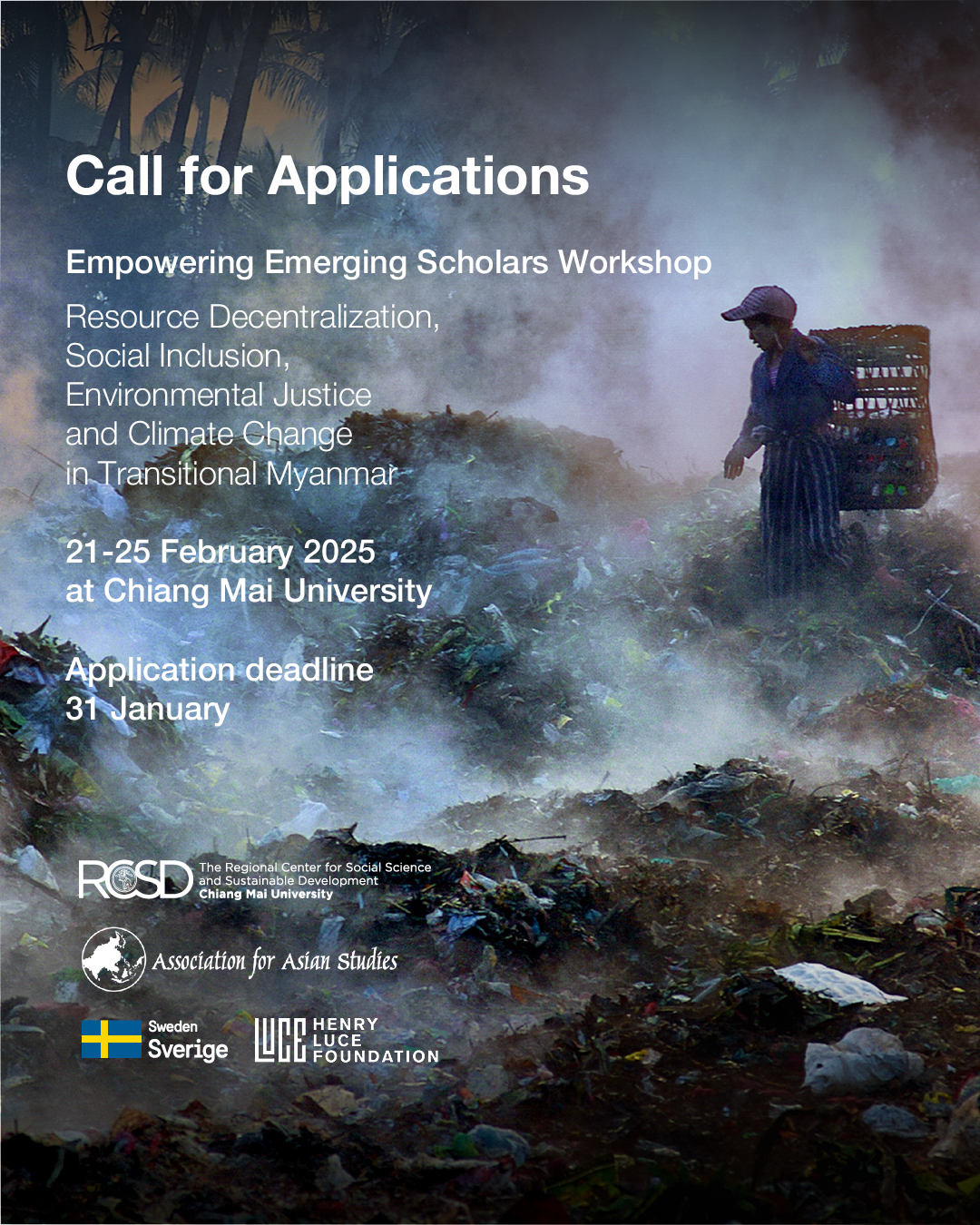Empowering Emerging Scholars: Resource Decentralization, Social Inclusion, Environmental Justice, and Climate Change in Transitional Myanmar, 21-25 February 2025 at Chiang Mai University
The Regional Center for Social Science and Sustainable Development (RCSD) of the Faculty of Social Sciences, Chiang Mai University, Chiang Mai, Thailand, would like to invite applications for the Workshop Researching Resource Decentralization, Social Inclusion, Environmental Justice, and Climate Change in the Context of Myanmar which will be held from 21 to 25 February 2025 at Chiang Mai University.
The workshop is a part of “Cultivating the Humanities and Social Sciences and Supporting Underrepresented Scholars of Asia” led by the Association for Asian Studies (AAS) and supported by SIDA – The Swedish International Development Cooperation Agency. It aims to support scholars in economically disadvantaged South and Southeast Asia regions, particularly junior faculty, graduate students, senior and independent scholars, women, and ethnic minority groups. It is co-funded by the Herry Luce Foundation under the project on Co-producing Knowledge on Inclusivity in Burma.
The workshop is designed to enhance the research capacity of young emerging scholars from Myanmar and Southeast Asia, enabling them to critically analyze social transformations in Myanmar related to critical issues such as resources, the environment, and climate change. Emphasizing participatory research and the co-production of knowledge, the program seeks to foster a network of scholars and community researchers from Myanmar and SEA countries. Additionally, it promotes collaboration, networking, and the exchange of ideas, offering participants an opportunity to develop and present their new or ongoing research. The initiative aims to empower locally engaged scholars to contribute effectively to their communities and beyond.
Contributions of the applicants will focus on five main themes related to Myanmar:
- Resource management & resource decentralization linking with current Myanmar’s transformation
- Social inclusion in emerging education and cultural landscape
- Environment, land, and agroecological transition
- Local initiatives in commoning
- Climate change and climate resilience
Objectives
To broaden understanding and enhance critical analytical skills regarding Myanmar’s transformation in respective areas of resources, the environment, and climate change To foster a network of research fellows from Myanmar and SEA countries working in the areas of areas of resources, the environment, and climate change
Date and venue
The five-day workshop will run from Friday 21 – Tuesday 25 February 2025 at the Faculty of Social Sciences, Chiang Mai University.
Application and applicants’ qualifications
Applicants are expected to fit into one of the following categories:
- Hold at least a bachelor’s degree in relevant fields (graduate studies are preferred) and/or proven research experiences in related topics
- Independent researcher and teaching staff from an academic or non-academic institution in ethnic areas.
- Individuals from ASEAN countries engaging in research on any of the five thematic areas related to Myanmar.
- Myanmar researchers currently residing in Thailand working on the areas concerned.
- Applicants who meet the category requirements can begin the application process online here.
- A statement of purpose in the form of an essay/concept notes of no more than 500 words which reflects the theme of the workshop Researching resource decentralization, social inclusion, environmental justice, and climate change in the context of Myanmar, describing how your research idea or ongoing research is engaging with the social, environmental and climate change in your local context, what are symptom of (in) justice that resulted to the current crisis in Myanmar, in what ways local researchers envision more creative ways of contributing the community’s resilience.
- CV which includes your current status, educational training, and previous academic works and/or participation
Application deadline is 31st January 2025.
Important dates
31 January – application deadline
5 February – announcement of successful candidates
7 February – Confirmation of participation
21 – 25 February – the workshop
Funding
Successful candidates who live outside Chiang Mai will receive the following support:
- Full expenses for means of transportation for participants from Thailand and Myanmar
- Accommodation at the maximum of 6 nights from 20 – 26 February 2025.
- Meals and refreshments during the workshop
- Field trip cost
- Minimum perdiem for meals that are not covered by the workshop organizer
Small research funding can be applied for by participants for projects currently under development or to be developed, either individually or collaboratively. Up to five projects aligned with RCSD’s priorities will be selected based on their relevance to the four thematic areas. Each selected project will receive mentorship from senior academics.
Preparation and expected output
Before attending the workshop, participants are expected to review the provided materials to ensure active participation during the sessions. The expected outputs may include a draft research proposal, a paper, or other creative forms of communication. Participants must commit to attending the entire workshop program and completing the required assignments.
Background & approach of the workshop and workshop structure
The research capacity of universities and community-based research institutions in contested areas of Myanmar has been significantly undermined over the past decades by numerous challenges. Nevertheless, it remains a critical factor in fostering resilience among researchers, both individually and institutionally, to contribute to the inclusive and sustainable development of the war-torn country. Ongoing violence frequently disrupts academic schedules, displaces faculty and students, and hampers research continuity. The objective of this workshop is to enhance collaboration in knowledge co-creation between academic institutions and local communities, promoting inclusivity and sustainable development while contributing to long-term peacebuilding in their respective regions. The workshop seeks to establish a dynamic platform for exchanging ideas and relevant conceptual insights, ultimately strengthening the research capacity of emerging scholars.
The five-workshop will consist of a series of lectures, seminars on relevant issues, discussions, group activities, and a field trip.
For further queries regarding the workshop, please contact rcsd@cmu.ac.th

